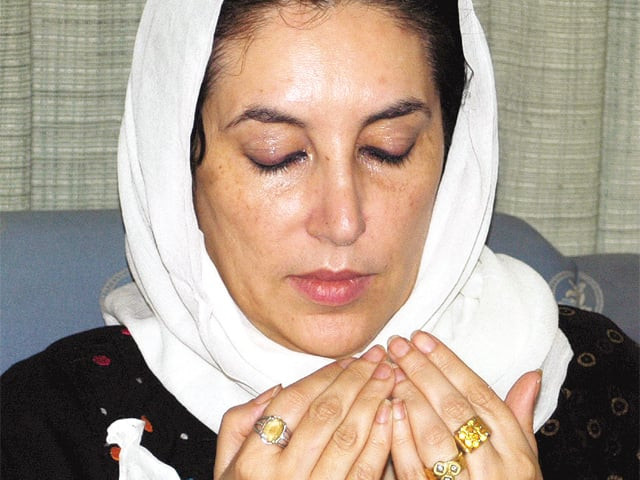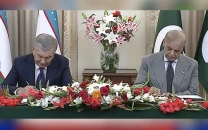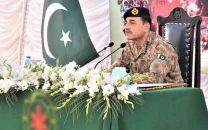Had Benazir lived...
Bhutto’s assassination dramatically altered the political landscape. What would things look like if she had lived?

Had Benazir lived...
As Benazir went around the country trying to revive the enthusiasm the electorate had once felt for her and her party, she would be aware of the cards she had up her sleeve. She was a part of the US policy of ‘diversification of support’ — the policy the US turned to after realising that Musharraf was either playing a double game or was simply not able to convince the military establishment to act effectively against the Taliban terrorists and their patron al Qaeda.
American support to her was to be conditional to her pushing Musharraf towards actions he was not taking, especially in the increasingly troubled FATA region where his subordinate generals were concluding predictably useless ‘peace deals’ with Taliban leaders who were determined to eliminate Musharraf and pluck Pakistan away from its alliance against terrorism. But she would have to strategise her return in the light of her past experience with the Pakistani establishment.
The al Qaeda, put off by the United State’s policy insistence to set up a rival to Musharraf to make him act faster and more effectively against the spreading counter-writ of the Taliban, would have issued new CD messages with Al Zawahiri proclaiming that a woman could not be a leader of the Muslims. This would have been echoed by allied madrassas across Pakistan. Growing anti-Americanism in Pakistan would have been used by the ISI to make people see her as an American Trojan horse sent in to enslave Pakistan.
Anti-PPP elements within the establishment — much abetted by the PML Q’s inherited hostility towards the Bhuttos — would have played ball. Once again the deal between Musharraf and Benazir would have caused rifts. The rightwing press would have dug up her past statements supporting Dr A Q Khan’s surrender to the Americans despite the fact that she had denied them. She would have soon to contend with clear signs of pre-election rigging in favour of a heavy tilt in favour of PML Q.
PPP regional leaders would have engaged in bickering with their counterparts over how much the coming vote would go to the two parties riding together as a coalition for the next five years. Much bitterness would have flowed from this, mostly over how power was to be shared in Punjab, where Pervaiz Elahi had run a good government and was nursing ambitions of becoming prime minister. The PPP would have insisted on pocketing Punjab as a part of the coalition deal.
Benazir would have reached out to the PML N to defeat adverse rigging in Punjab by showing overwhelming popular support for an informal PPP-PML N electoral understanding. On the matter of the judges dismissed by Musharraf in November 2007, she would have joined the PML N and called for their reinstatement, thus getting Pakistan’s mostly rightwing anti-PPP lawyers behind her. She would have forced Musharraf to come to the table with her and give her the lion’s share in the government in return for her letting him remain president.
Her handling of Musharraf, however, would have been informed by her past experience with army chiefs and the military establishment. Her pre-election politics would have been aimed at not threatening to upset the Afghanistan strategy, a strategy with with which she clearly did not agree. She would have talked to the Americans constantly through their ambassador but would have also realised that the Democrats were certainly going to win the 2009 election and that pressure on the next incumbent for US-NATO withdrawal would increase.
Her intent behind returning home would clearly not have meshed with the American intent behind getting Musharraf to accept her back. Like Nawaz Sharif, she wanted to prevent the ‘political memory’ in Pakistan from dropping her party from the popular radar. She would have been cautious rather than rash in the country’s changed environment. But her relationship with Musharraf and the PML Q would have run into rough waters — as she had indicated in her last book and her letter to Musharraf in which she feared that certain members of the PML Q and elements in the intelligence agencies would plan to get rid of her.
Once in Pakistan, she would have taken a stance closer to the PML N- there were signs of this after the attack on her in Karachi. Her relationship with the MQM would have remained sour because of the latter’s close working partnership with Musharraf, but she would have applied pragmatism to her handling of the ANP. Returning from the wilderness and seeing all the changes in Sindh, she would have learned, however, to accept the MQM’s own ‘realism’ in not provoking the dominant Sindhi party.
Her post-election presence in the government would have been dicey. How was would the PML Q adjust to the change? It is quite possible that because of Punjab the tally of seats would have mandated a prime minister from the Chaudhry clan. (The 17th Amendment debarred both Nawaz Sharif and Benazir from premiership.) In case the 17th Amendment ban was removed, Benazir as coalition prime minister would have worked, but it would have been ‘overbalanced’ by Musharraf in the presidency, calling all the shots as far as foreign policy was concerned. The coalition would be rancorous and unstable. She would have therefore relied on her counterbalancing alliance with Nawaz Sharif on the basis of the 2006 Charter of Democracy.
Nawaz Sharif, of course, would have been back, his return forced by the Saudis. Benazir would have persuaded him to take part in the elections. The post-election government in Punjab would have belonged to PML Q, but would have been harassed by the two big parties in opposition. The Mumbai attack in 2008 would have caused a political earthquake, giving Benazir more leverage over Musharraf and the army. It would have been a very divided and internecine coalition over which Musharraf would have had to preside.
Benazir would have quickly realised that Prime Minister Shaukat Aziz had erred in not passing on the oil price hike the world was hit by in 2007. The Indian summer of the economic boom under him would clearly have been at an end when the 2008 worldwide crisis broke and found Pakistan with its pants down, with a circular debt overhang of 300 billion rupees. She would have severely rocked the coalition boat and worked for a mid-term election.
Published in The Express Tribune December 26th, 2010.



















COMMENTS
Comments are moderated and generally will be posted if they are on-topic and not abusive.
For more information, please see our Comments FAQ